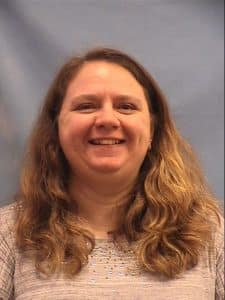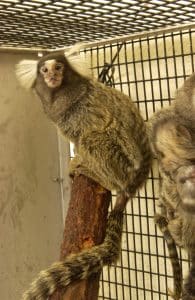
Corinna Ross, Ph.D., has joined the Texas Biomedical Research Institute’s Southwest National Primate Research Center as an Associate Scientist, bringing internationally recognized expertise in the management and use of the marmoset monkey. Marmosets are New World monkeys that hail from Brazil and are critical to research currently being conducted by scientists at the SNPRC and the Barshop Institute for Longevity and Aging Studies at UT Health San Antonio. Dr. Ross, who has been an adjunct scientist at Texas Biomed since 2006, assumed her new role in SNPRC on September 11. She brings more than 20 years of experience with marmosets.
Dr. Ross is currently an associate professor in the Department of Science and Mathematics at Texas A&M University San Antonio and an adjunct professor in the Department of Cellular Systems and Anatomy at UT Health San Antonio. When Dr. Ross began working at UT Health in 2006 as postdoctoral scientist, she worked closely with Dr. Suzette Tardif, Associate Director of the SNPRC. Dr. Tardif will retire in June of 2019 and is assisting with Dr. Ross’ transition into the role.
“My research and career has focused on marmosets as a biological translational model for human health and has explored topics including pediatric obesity prevention, and development of interventions to increase health span,” Dr. Ross explained. “We have learned over the years that marmosets can actually live longer than originally thought, so they are proving to be very good models for age-related studies. I am very excited about the primate colony team that has been built at SNPRC, and this is an excellent opportunity for me to be integrated into the team and bring the marmoset model to the forefront.”
SNPRC is one of only two national primate research centers that provide marmoset research resources. SNPRC houses the largest population of aged marmosets (older than 10 years) in the country. As a non-endangered primate of small size, with the highest fertility (usually producing dizygotic twins) and the shortest life span, marmosets offer a unique nonhuman primate model for biomedical research, particularly in genomics, regenerative medicine, obesity, aging and reproduction research.

“Dr. Ross is a critical addition to the team and will ensure continuity and growth of our marmoset colony and the vital research it supports,” Dr. Tardif said. “I am excited she is taking on this role.”
Texas Biomed most recently invested $2.5 million dollars to renovate 12,000 square feet of the John Dougherty building, dedicating the entire facility exclusively for marmoset housing and research. The facility will maintain a separate wing for geriatric marmosets.
“It is an important distinction for geriatric marmosets so that we use stricter protocols in this area to increase longevity, allowing scientists to more closely mimic human longevity, providing an even better model for aging,” Ross said. “This is an incredible investment by Texas Biomed and one that will greatly further biomedical research.”
Dr. Ross is a co-investigator and co-principal investigator on two current NIH grants and two Pepper Center grants worth nearly $5 million that focus on marmosets as models for longevity and aging, gut microbiome, and reproductive development. Dr. Ross received her Ph.D. in biology from the University of Nebraska Lincoln. She has published more than 30 scientific manuscripts and just this year received the 2018 Faculty Excellence in Service from Texas A&M University San Antonio. She also serves on the Editorial Board for the American Journal of Primatology and is Secretary for the Executive Board of the American Society of Primatologists having just finished her role as Treasurer for the Society.
Texas A&M San Antonio and UT Health San Antonio are critical partners in developing the pipeline of skilled professionals necessary to the Institute’s research, animal care and professional teams.
Dr. Ross added that she expects even greater collaboration between the three organizations. Several of her former students, among others who studied at the universities, now work at Texas Biomed as research assistants or in the animal care program.
“My students are excited, because I can now begin shifting them to Texas Biomed to work with this animal model in brand new facilities, giving the students experience they need while providing Texas Biomed essential personnel,” Dr. Ross said.
President and CEO of Texas Biomed Dr. Larry Schlesinger added, “Dr. Ross’ compassion and care for the animals is palpable, and her expertise is outstanding. I look forward to seeing her mature the program and our partnership with both Texas A&M University San Antonio and UT Health San Antonio.”